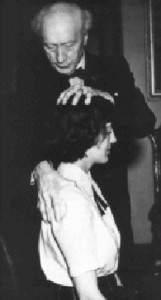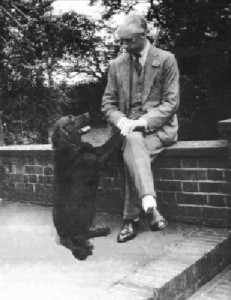Who was F M Alexander?
Born in Tasmania in 1869, Alexander was a successful actor and reciter whose career was cut short by loss of voice during performances. With no help forthcoming from the medical profession, Alexander undertook an intensive examination of himself in action, convinced that the source of his voice problem lay in the way he used his body.
A long period of research led him to discover certain principles affecting mind/body co-ordination applicable to every kind of physical activity. With this knowledge he went on to cure his own voice problem and found that he could also help others.
It was at this point that teaching his method became the main focus of his life. Alexander arrived in England in 1904 and during the next 25 years built up a practice in London and the USA.
 He had many influential supporters among whom were Sir Henry Irving, Bernard Shaw,John Dewey, Aldous Huxley and Sir Stafford Cripps.
He had many influential supporters among whom were Sir Henry Irving, Bernard Shaw,John Dewey, Aldous Huxley and Sir Stafford Cripps.
In 1931 he began training others to teach the Technique.
He continued to do so until his death at the age of 86. After his death Walter Carrington took over Alexander’s training course. He had been assisting him since his qualification in 1939 and again after WWII.
Today the importance of Alexander’s discoveries is confirmed by the existence of a rapidly growing body of teachers of his method. There are more than 1,000 Alexander teachers practicing in the world. Many of them are members of the Society of Teachers of the Alexander Technique (STAT) founded in 1958 to maintain professional standards. There are Societies affiliated to STAT in seven countries outside the UK. The professional body in the USA is the American Society for the Alexander Technique (AmSAT).
“My Technique is based on the inhibition of undesirable, unwanted responses to stimuli, and hence it is primarily a technique for the development of the control of human reaction.”
– Frederick Matthias Alexander
